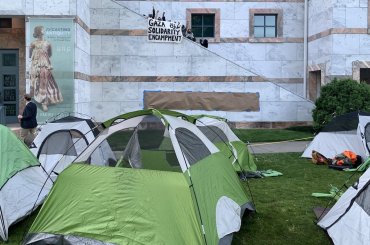In a referendum which ended at noon yesterday, Barnard students voted overwhelmingly in favor of a resolution calling on the university to divest from companies complicit in Palestinian human rights violations.
With 1,153 total votes cast, 741 students voted in favor while 412 voted against the resolution. This puts the pro referendum vote percentage at 64.3%, versus just 35.7% for no voters.
Nearly fifty percent of students cast ballots, making yesterday’s turnout the largest in Barnard’s history, according to the Student Government Association.
In what one former student described as “foreboding,” the unprecedented results happened to occur seventy years after the Nakba.
The companies that organizers have targeted for divestment are Hyundai Heavy Industries, Caterpillar, Lockheed Martin, Boeing, Elbit Systems, Hewlett Packard Enterprise, Bank Hapoalim and Mekorot.
As its name suggests, Columbia University Apartheid Divest (CUAD), a coalition of Columbia and Barnard Students for Justice in Palestine (SJP) and Jewish Voice for Peace (JVP), has steadily advocated for divestment since its founding in 2016.
Caroline Oliver, a Barnard sophomore and member of CUAD heard the news when she got out of a midterm for a Palestine/Israel class.
“I didn’t wake up confident this was going to happen,” Oliver told Mondoweiss, explaining that Palestine solidarity isn’t often met with positive reception. “So when it did pass by a huge margin and so many people participated, everybody’s mind was blown.”
The general strategy of CUAD has always been the longterm, Barnard Referendum Committee member and Columbia sophomore Nasreen Abd Elal said.
CUAD expected generations of organizing before reaching a “substantive divestment victory,” Abd Elal told me.
“So the fact that it’s happened this year and with this referendum, this has been the farthest we’ve gotten in the campaign,” the Barnard sophomore and Palestinian exiled from her family’s East Jerusalem added. “It’s really incredible. And I think everyone’s reeling, not just the organizers that are here today, but also the founding members of SJP, from over a decade ago.”
Barnard and Columbia students and administration have often targeted Palestinian solidarity and censored Palestinian voices on campus.

“It was only a few years ago that a banner reading ‘Stand for Justice, Stand for Palestine got taken down” after some students characterized as offensive Abd Elal told Mondoweiss. “There’s been a complete shift in consciousness on the campus.”
The vote comes as students across the US introduce their own divestment resolutions at a rapid clip. Just in the next two weeks divestment votes will take place George Washington University on April 23 and Apartheid Divest CUNY on May 6.
CUAD presented on divestment exactly a month ago. Barnard students Caroline Oliver, Alla Issa and Marla Solow spent some two hours making their case before the Student Government Association (SGA) of the college. Despite heckles and vocal opposition from campus Zionist groups like Students Standing with Israel (SSI), the SGA voted to open a referendum on the issue.
“This is just the beginning of what is going to be a long process throughout the rest of my college experience and even [for] those that come after us,” Alla Issa said.
Yesterday’s referendum vote was in fact just the beginning of what will likely be a drawn out fight as it winds its way through the halls of power.
At SGA’s next meeting, the Representative Council will vote on whether or not to send a letter in support of divestment to the administration. Because SGA exists to represent the student body, this step is essentially a formality. Along with SGA’s recommendation, CUAD will send a draft resolution.
Neither the President nor Vice President for Policy of SGA have responded to Mondoweiss’ request for comment.
And even if the resolution makes it all the way to the Board of Trustees, they can still reject it or adopt an alternative, watered down resolution as happened with a recent campaign to divest from climate-change denying companies.
Still, the vote marks a significant change in student and administrative opinion from only a few years ago. Janine Salman, a former member of SJP and CUAD who graduated from Columbia in May 2017, recalled the student body’s and administration’s attitude towards Palestine organizing before and while she was a student.
“When I joined SJP back in 2013, the campus climate when it came to Palestine was hugely different; and also the national conversation surrounding Palestine was entirely different,” Salman told Mondoweiss.
“We had just been suspended three years earlier by the administration on a technicality. So it was a pretty, pretty difficult situation for organizing,” Salman added.
But years of solidarity organizing with other campus activist groups and especially the seventy years of Palestinian resistance and organizing laid the foundation for yesterday’s decision.
After years of struggling to be heard, the March 19 SGA meeting finally allowed CUAD “an opportunity to access the Barnard community and gave us a platform in a way that we’d never had before” said Caroline Oliver.
“For us to get those numbers, it means people who aren’t really involved on the campus left, who aren’t necessarily politicized on the Palestine issue, don’t really know the whole history — they came out to vote in favor of us.
“They heard our argument and were convinced by it to see Palestinians as people and this movement as a moral cause. Barnard students recognized that what is happening in Palestine is atrocious and came out [to vote] because they care” Oliver added.
Janine Salman told Mondoweiss that years ago she and a friend bet on what they believed the outcome would be on an eventual divestment referendum. Salman predicted the vote would be approximately 70% against and 30% in favor.
“But yesterday, we saw literally the exact opposite,” Salman said.
Wednesday night, Columbia SJP hosted their Palestinian Cultural Night, complete with very much Dabke, food and more. But the night could have taken a much more somber tone if the vote was different.
But instead, students were ecstatic.
“We’re so excited. We’re very much looking forward to moving ahead in the process, but tonight’s a night for celebration,” Issa told me. “We’ll worry about the process tomorrow morning.”



AIPAC has lost its mojo. And as journos like Blitzer near retirement Israel has no control over the media any longer. Trying to spin Israel is harder than putting lipstick on a pig.
And it will not get any better either.
The pro-Palestinian movement is worldwide.
https://www.theaustralian.com. au/higher-education/ university-of-sydney- academics-to-boycott-israeli- universities/news-story/ f27793c3c3fdda9c6b8f253db90af0 b5
The Australian, April 12, 2018
University of Sydney academics to boycott Israeli universities
Academics from Sydney University are boycotting any ties with Israel.
EXCERPT:
“At least 37 University of Sydney arts and social sciences academics have rallied behind a move to boycott Israeli universities following the recent killing of Palestinian protesters in Gaza.
“They have signed a pledge to break all official contact with Israeli universities until Israel ends its occupation of UN-defined Palestinian land, grants full equality before the law to Palestinian citizens of Israel, and recognises Palestinians’ right to return to the homes from which they were expelled in the 1948 war.
“These pledge signatories will not attend conferences sponsored by Israeli universities, participate in academic exchange schemes, or otherwise collaborate professionally with Israeli universities until the stated goals have been fulfilled.”
Congratulations!